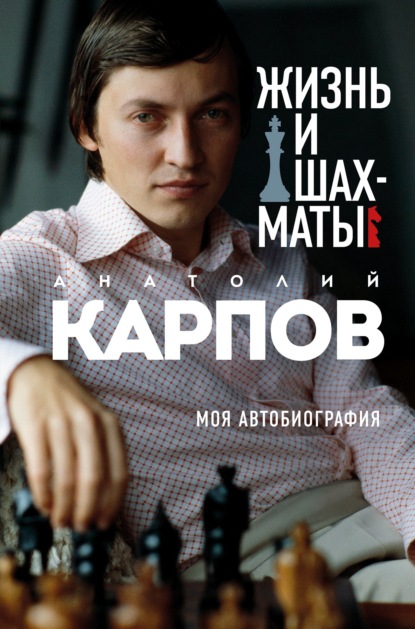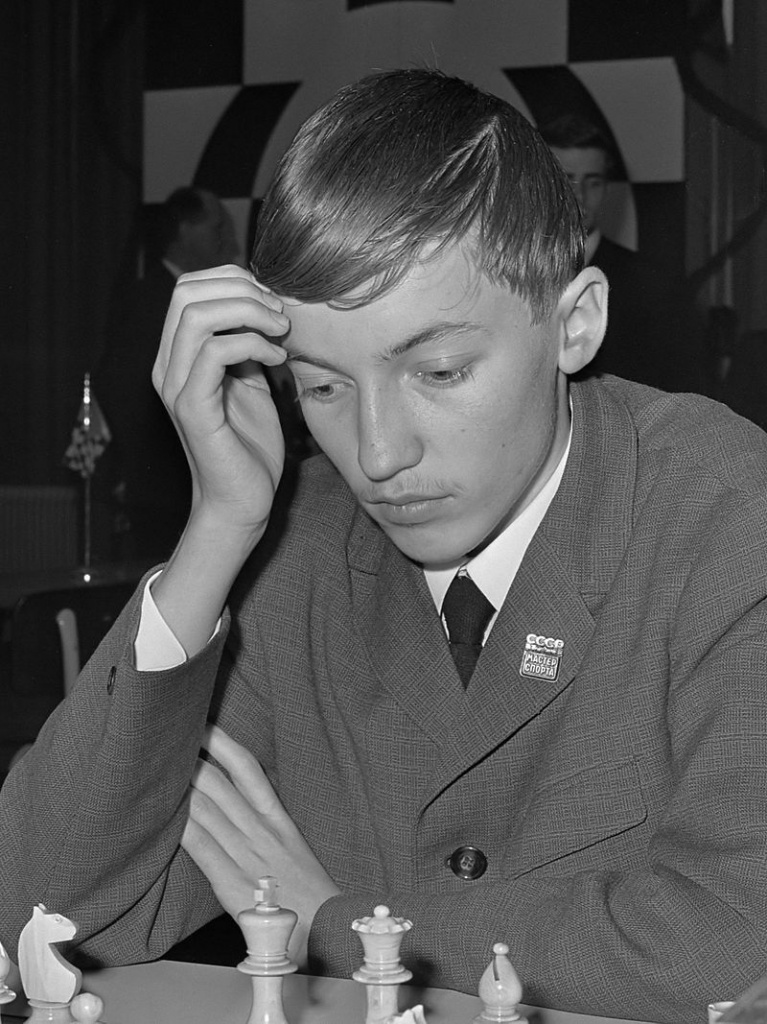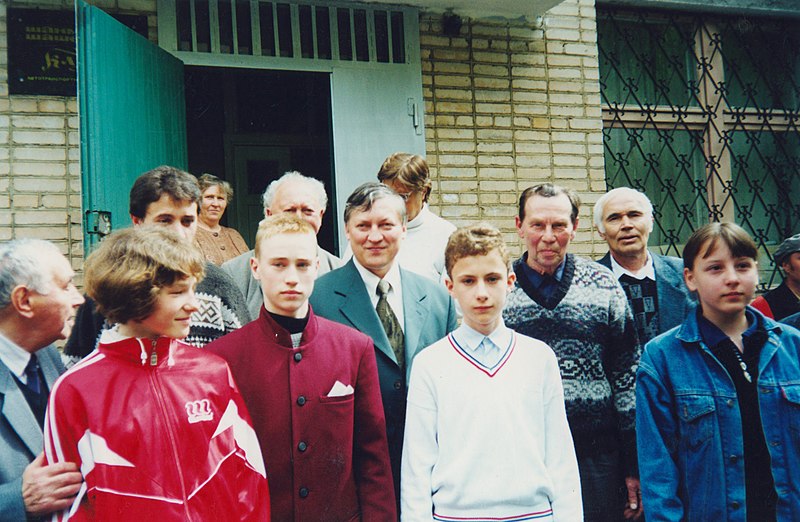
His life is like a chess game
/ Главная / Russkiy Mir Foundation / Publications / His life is like a chess gameHis life is like a chess game
The name of Russian master player Anatoly Karpov is well-known all over the world. He was the 12th World Chess Champion from 1975 to 1985, World Chess champion, a three-time FIDE World Champion in chess, and also three-time world champion according to FIDE. In total, he has 186 victories in international tournaments; the last of them he won just recently. Karpov is also known for his extensive social activities. He's the founder of a chain of children's chess schools around the world and the author of more than 30 books. In his recent book, Life and Chess. My Autobiography, Anatoly Karpov talks about his time, the "Karpov Era."

Anatoly Karpov. Life and Chess. My Autobiography. Moscow, Eksmo, 2022.
Wonderful tune
It turns out that the future champion's parents were really concerned about his passion for chess, especially his mother. It seemed to her strange and even abnormal that a three-year-old child would spend hours at the chessboard instead of the toys that are customary for such age. She even tried to forbid the boy to think about chess being worried for his mental health. And every time she saw her son's concentrated gaze, she would come up and ask him strictly, "Are you playing?" But all prohibitions turned out to be in vain. "As soon as the wooden figures begin their magical movement through the boxes, something inside me responds to a wonderful tune that cannot be heard by others. It captures me completely," Anatoly Karpov describes his childhood impressions of the game. Soon parents also realized that chess was not a random child's whim in their son's life but a real involvement.
By the way, it was chess that helped Anatoly Karpov solve his health problems, although it would seem that the game had nothing to do with it. In his early years, he was a frail child who spent in hospital several months a year. But when the young chess player started training at the Botvinnik Chess School, his poor health was noticed. Karpov was not strong enough to play for a long time. Karpov got serious about his health after he turned 11, improving his endurance and doing some weight training. And he stopped getting sick.
Anatoly Karpov Schools
Today, Anatoly Karpov devotes a great deal of time and effort to promoting chess among children. The chain of Karpov Schools of Chess operates all over the world - in Argentina, the USA, and France. Now there are negotiations about opening one of the schools in Spain. Karpov chess schools to be established in Tunisia and Portugal in 2022,

Anatoly Karpov in 1967 at the age of 16. Photo credit: ru.wikipedia.org
There are also Anatoly Karpov Schools of Chess in 42 regions of Russia, including the Tyumen Oblast, which the chess player represents as a deputy in the State Duma. This region has become a leader in teaching chess to children as nearly every kindergarten and school have dedicated classes there. More than 460 teachers have been trained to teach chess to children over the decade.

Anatoly Karpov with his first coach Dmitry Zyulyarkin and young chess players in his native Zlatoust in 2001 Photo credit: ru.wikipedia.org
Anatoly Karpov believes that teaching children to play chess is a very wise decision that will benefit them in any case. "Chess can help them build up decisions in an appropriate way, defend their decisions, exercise memory, develop logical reasoning, and strategic concepts. When chess is included in the academic activities, children learn to focus and make better progress in other subjects," explains the world champion. He has no students of his own as he simply lacks time for one-on-one training. Nevertheless, he gives lectures, answers questions, and holds chess masterclasses at his schools on a regular basis.
The soft power of chess
However, his life is not about chess only. Perhaps, this is the reason why life comes in the book title first, while chess is the second. Anatoly Karpov has been the head of the Peace Foundation, one of the oldest public organizations in our country, for 40 years. It seems fair to say that he was appointed the chairman at a very young age. Back then he was 31. The experience has shown that the choice was the right one: Anatoly Karpov is the very person who is capable to establish informal relationships that can often be used to make off-stage politics.
Here is an interesting fact: he is a holder of the highest order of Argentina. Although he was awarded not for his chess achievements but rather for his contributions in solving the country's economic woes. One might wonder how Anatoly Karpov could be connected to the economy of Argentina. Nevertheless, the connection was there. He was in Argentina when the country was facing imminent default due to its failure to pay the interest on IMF loans. And Karpov's friend, Argentina's Minister of Economy, invited him to share his views at a conference dedicated to the issue. After that, the world chess champion was invited to join an international committee on the IMF loan renegotiation. The committee activities resulted in the loan easing, which was a positive result. Three years later, Anatoly Karpov was awarded the highest order of Argentina for facilitating the solution to that major issue.

Anatoly Karpov during his UN visit, 2017. Photo credit: Veni / flickr.com
This is an example of how his chess contacts helped him come up with his political masterstrokes and win the most unexpected games. Karpov has met and been acquainted with at least four U.S. presidents. He even managed to establish a friendship with Secretary of State Brzezinski.
When it comes to chess, Anatoly Karpov is a grandmaster next to none - he is a holder of all the chess records. He has played in 11 world championship finals and won 16 world titles (8 of them from in the team competitions and 8 as an individual chess player). And three months ago, Karpov won his 186th international tournament by defeating a young grandmaster from France. His opponent had announced very confidently before the match that if he lost to Karpov, he would give up chess. Having lost, he had to disown his statement. By the way, Karpov still has not participated in veteran competitions, otherwise, his winning record would have exceeded 200.
Anatoly Karpov's autobiography does not contain descriptions of chess games and their detailed analyses. According to the author, he wanted the book to be read by as many people as possible even if they don't play chess but still want to win in life. This is exactly what the book is about.
New publications

 Mikhail Kalatozov, a director who transformed the world of cinematography in many ways, was born 120 years ago. He was a Soviet film official and a propagandist. Above all, he was capable of producing movies that struck viewers with their power and poetic language.
Mikhail Kalatozov, a director who transformed the world of cinematography in many ways, was born 120 years ago. He was a Soviet film official and a propagandist. Above all, he was capable of producing movies that struck viewers with their power and poetic language.  Ukrainian authorities have launched a persecution campaign against the canonical Ukrainian Orthodox Church (UOC), the biggest one in the country's modern history. Over the past year, state sanctions were imposed on clergy representatives, searches were conducted in churches, clergymen were arrested, criminal cases were initiated, the activity of the UOC was banned in various regions of the country, and monasteries and churches were seized.
Ukrainian authorities have launched a persecution campaign against the canonical Ukrainian Orthodox Church (UOC), the biggest one in the country's modern history. Over the past year, state sanctions were imposed on clergy representatives, searches were conducted in churches, clergymen were arrested, criminal cases were initiated, the activity of the UOC was banned in various regions of the country, and monasteries and churches were seized.  When Nektary Kotlyaroff, a fourth-generation Russian Australian and founder of the Russian Orthodox Choir in Sydney, first visited Russia, the first person he spoke to was a cab driver at the airport. Having heard that Nektariy's ancestors left Russia more than 100 years ago, the driver was astonished, "How come you haven't forgotten the Russian language?" Nektary Kotlyaroff repeated his answer in an interview with the Russkiy Mir. His affinity to the Orthodox Church (many of his ancestors and relatives were priests) and the traditions of a large Russian family brought from Russia helped him to preserve the Russian language.
When Nektary Kotlyaroff, a fourth-generation Russian Australian and founder of the Russian Orthodox Choir in Sydney, first visited Russia, the first person he spoke to was a cab driver at the airport. Having heard that Nektariy's ancestors left Russia more than 100 years ago, the driver was astonished, "How come you haven't forgotten the Russian language?" Nektary Kotlyaroff repeated his answer in an interview with the Russkiy Mir. His affinity to the Orthodox Church (many of his ancestors and relatives were priests) and the traditions of a large Russian family brought from Russia helped him to preserve the Russian language.

 The leaders of the Friends of the Great Russia cultural association (Amici Della Grande Russia) in Italy believe that the Western policy of abolishing Russian culture in Europe has finally failed. Furthermore, it was doomed to failure from the beginning.
The leaders of the Friends of the Great Russia cultural association (Amici Della Grande Russia) in Italy believe that the Western policy of abolishing Russian culture in Europe has finally failed. Furthermore, it was doomed to failure from the beginning.  Name of Vladimir Nemirovich-Danchenko is inscribed in the history of Russian theater along with Konstantin Stanislavski, the other founding father of the Moscow Art Theater. Nevertheless, Mr. Nemirovich-Danchenko was a renowned writer, playwright, and theater teacher even before their famous meeting in the Slavic Bazaar restaurant. Furthermore, it was Mr. Nemirovich-Danchenko who came up with the idea of establishing a new "people's" theater believing that the theater could become a "department of public education."
Name of Vladimir Nemirovich-Danchenko is inscribed in the history of Russian theater along with Konstantin Stanislavski, the other founding father of the Moscow Art Theater. Nevertheless, Mr. Nemirovich-Danchenko was a renowned writer, playwright, and theater teacher even before their famous meeting in the Slavic Bazaar restaurant. Furthermore, it was Mr. Nemirovich-Danchenko who came up with the idea of establishing a new "people's" theater believing that the theater could become a "department of public education."  "Russia is a thing of which the intellect cannot conceive..." by Fyodor Tyutchev are famous among Russians at least. December marks the 220th anniversary of the poet's birth. Yet, he never considered poetry to be his life's mission and was preoccupied with matters of a global scale. Mr.Tyutchev fought his war focusing on relations between Russia and the West, the origins of mutual misunderstanding, and the origins of Russophobia. When you read his works today, it feels as though he saw things coming in a crystal ball...
"Russia is a thing of which the intellect cannot conceive..." by Fyodor Tyutchev are famous among Russians at least. December marks the 220th anniversary of the poet's birth. Yet, he never considered poetry to be his life's mission and was preoccupied with matters of a global scale. Mr.Tyutchev fought his war focusing on relations between Russia and the West, the origins of mutual misunderstanding, and the origins of Russophobia. When you read his works today, it feels as though he saw things coming in a crystal ball...